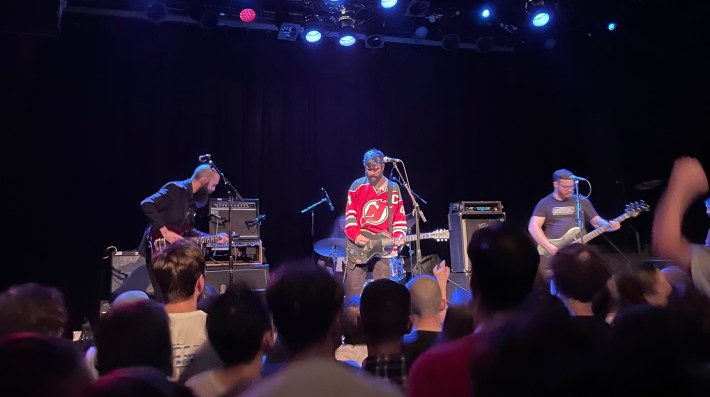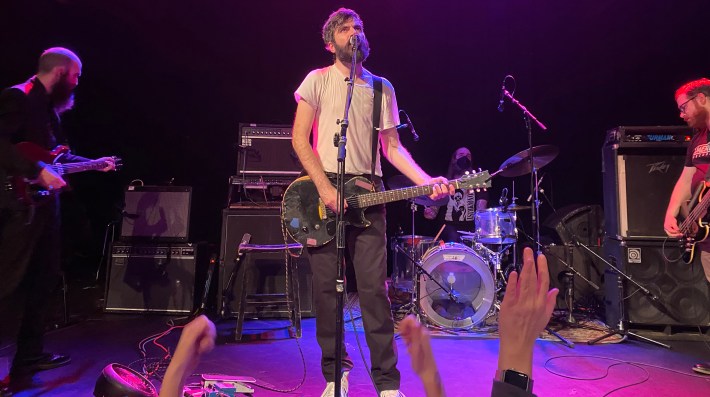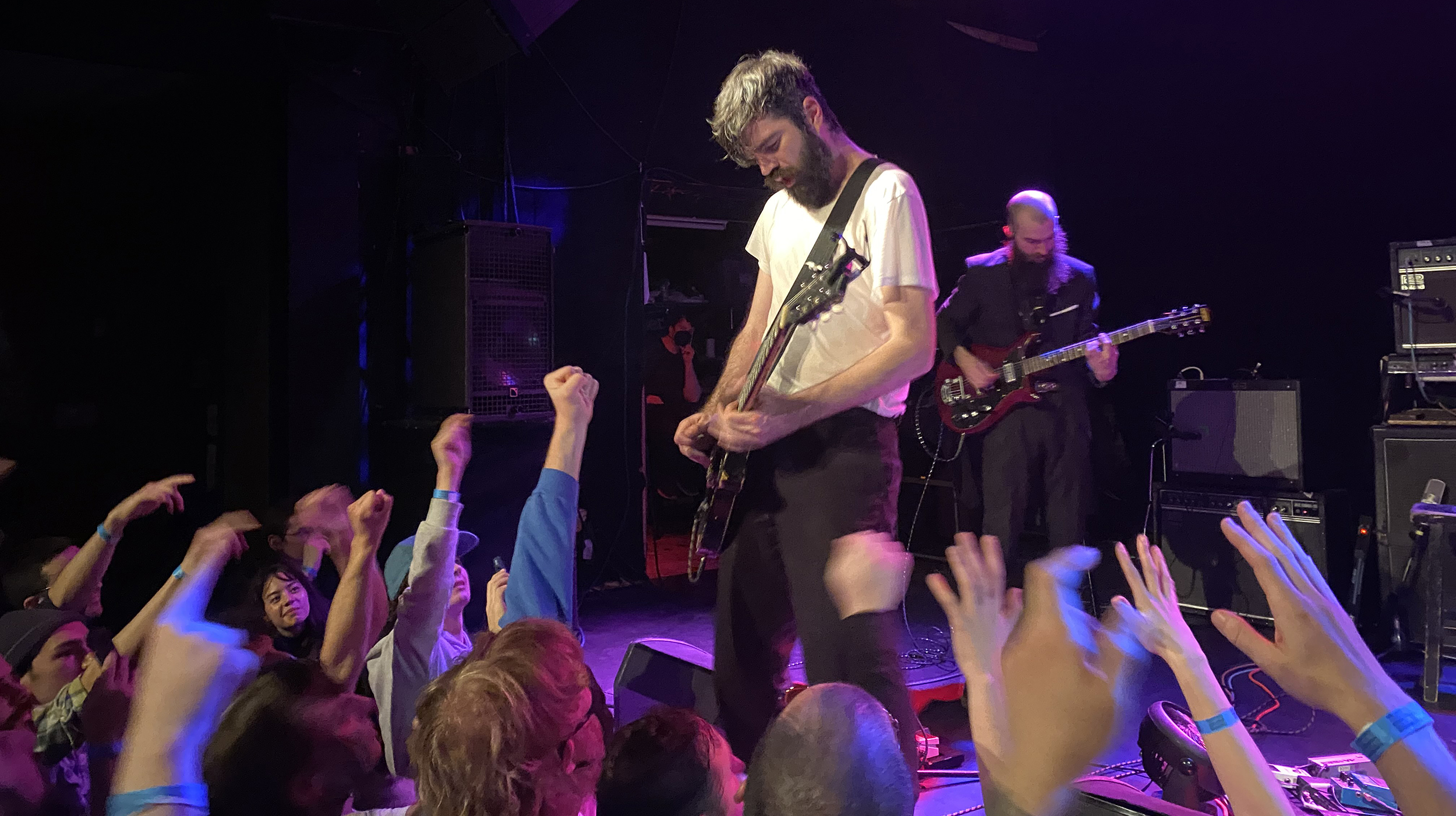I am sick and tired of having new-again experiences during the pandemic. So many things from my pre-coronavirus life fell out of the rotation for over a year, and I'm only now starting to get them back. The first time I went to a restaurant and sat inside; the first time I went to a movie theater; the first time I went to a party; the first time I yelled my favorite songs at karaoke. All of these experiences have reopened to me now that I am vaccinated—and boosted, as of last week—and all have come accompanied by a manic, bittersweet energy. They're all somehow too big, too significant-seeming for things that are, or were, just what my normal life was. I just want them to feel normal again.
On Sunday night, I finally returned to the one place I missed perhaps most of all, and one that feels as familiar to me as breathing: the mosh pit. Specifically, I dragged myself out of the apartment at the last minute to go see New Jersey rockers Titus Andronicus perform their seminal album The Monitor at Music Hall of Williamsburg in Brooklyn. I bought tickets for the show in June; it was clear even then that this was the show I've been unknowingly waiting for since the words "social distancing" came into my life last March.
As with any rock-leaning dude around my old age of 32, The Monitor is one of those albums that will never leave me. I've listened to it in good times and listened to it even more fervently in bad ones. There was a period of time in 2012 when I was miserable at my social media job and would just loop the album on repeat for weeks at a time.
I know every word, and so did everyone else at the show on Sunday night; they even shouted along to the recordings of Abraham Lincoln and William Lloyd Garrison that punctuate the album, which is a concept piece that addresses various modern social and cultural ills through the loose framework of the Civil War. I arrived a few songs into Titus's set, after waffling on whether I actually wanted to go to the show until the very last minute. Thankfully, I arrived in time to hear "A More Perfect Union," which is unironically the best rock song in the world to me. The ambivalence with which I'd left my apartment was gone.
Inside the venue, I met up with a friend on the platforms to the left of the stage; close enough to see and feel everything, but safely outside the wildest part of it. As soon as frontman Patrick Stickles screamed "Because tramps like us, baby, we were born to die," I knew that I had to get closer, and turn back the clock just a bit further.
The last time I saw Titus Andronicus was in December of 2012, at Webster Hall in Manhattan. I arrived just as the doors opened, convinced that I had to be as close as possible to the stage for what was either my fifth or sixth time seeing the band. I had run over from my apartment three blocks away in a t-shirt, not wanting to be encumbered by silly things such as jackets or other extraneous layers of any kind. I also made the poor choice to wear my red Converse high-tops, which were promptly destroyed when someone stepped on the side of one and ripped it clean off the sole. I moshed, and crowd-surfed, and leapt off the stage during the climactic 14-minute closer "The Battle of Hampton Roads." It was one of the best shows I've ever been to, and well worth the cold I unsurprisingly caught from chain-smoking cigarettes jacket-less in the snow.
Nine years later, I approached things differently. I wore a coat and a Defector hoodie (both promptly coat-checked). I wore sensible footwear: a new pair of boots that I'm still breaking in but which provided more than enough protection for my toes and which, thankfully, did not suffer any damage. I also knew that I would not have the stamina to stay moshing for the entire two-hour set; that is a young man's game, and though I don't think I'm that old just yet, I'm definitely too old for that. I made a plan, or anyway made a decision. I ran into the middle of the pit towards the end of "A More Perfect Union," and stayed there for the next three songs.
Those familiar with The Monitor will understand why that was exactly the right amount of time. "Titus Andronicus Forever" is a roaring two-minute showstopper whose main lyric is the very shoutable, uncomfortably timely "the enemy is everywhere!" I wasn't fully prepared, after 18 months of near-isolation, to be banged around by dozens of sweaty bodies, all screaming along with me. I definitely wasn't emotionally ready for that to be followed by "No Future Part Three: Escape From No Future," one of the centerpieces of The Monitor. That song's climactic singalong goes, "You will always be a loser." I hugged strangers, and I watched them bop and jump and bounce in a mass chemical reaction of catharsis. People were crying, and though I don't want to speak for them, they felt like tears of relief. This was likely a handful of moshers' first show back after a long time away, and the sheer overwhelming force of it all felt perfect, and perfectly cathartic. These songs, this setting, and this moment could not have been designed to more effectively release as many emotions as can fit in one human person.
By the time the band ripped through the effervescent "Richard II or Extraordinary Popular Dimensions and the Madness of Crowds (Responsible Hate Anthem)" with an exhausting, exhaustive fury, my age and atrophied stamina had gotten the best of me. I stepped out of the pit, drenched in sweat both mine and foreign, and stood under an air conditioning vent to recover. The timing was perfect; though "A Pot In Which To Piss" has its moment of moshing frenzy, the show took a much needed breath for about 45 minutes while the slower middle third of the album played out. Stickles also did an extended bit in which he talked to a "bartender" on the side of the stage about his life in a faux-drunken monologue that led friend of the program Lindsey Adler to say he was giving off "worst boyfriend you'll ever have" energy.
That endless interlude—the weakest part of the show, but also one that shows how much Stickles has grown in the years I've been away from his shows; 2012 Stickles would have never done it, I think—gave me just enough time to get one last burst of energy. Mostly, I didn't want to miss a moment like the one at the end of "To Old Friends And New," a beautiful song about loving the ones you love despite or even because of their flaws. Its climactic lyrics are an affirmation of the choices we make, and the entire crowd sang along like it was life-or-death: "It's alright, the way that you live, it's alright, the way that you live." I wish I had been there with them.
As that song faded out, I made my move, diving back into the mass of humanity for "...And Ever," a bouncier reprise of "Titus Andronicus Forever," and the grand climax that is "The Battle of Hampton Roads." I don't expect anyone unfamiliar with the band to listen to that 14-minute song right now, but it might help you to know that it goes from a fast-spoken diatribe to a bagpipe-laden coda, with guitar solos on top of guitar solos, and that it is also objectively even more over-the-top than that description makes it sound. This was the moment I had waited for for so long. It led me, in a fit of ecstatic hysteria, to scream "I love you all!" to my fellow pit-goers. I got a few exhausted chuckles in return. I regret nothing.
It is a strange thing to yell at strangers, especially after these years apart. But it was what and how I felt, and I felt that way because of the joy that filled that room, from the stage and from the crowd. I have not felt that kind of unbridled joy in a very long time. It also completely wiped me out. I showed my age after "Hampton Roads" and backed out of the pit for the last time, my entire body feeling like one big bruise. That meant that I missed out, once again, on being in the crowd for "A More Perfect Union," as the band inexplicably but thankfully played through the album opener again. Since this is a sports blog, I must also share that Stickles donned a Scott Stevens New Jersey Devils jersey for this version, because Titus Andronicus is New Jersey through and through:

By the time the band ripped through a cover of "Blitzkrieg Bop" for its encore, I was spent, physically, mentally, and emotionally. 23-year-old me would have never left the pit, but he certainly would have run screaming back in for that. The 32-year-old version simply got his jacket from coat check, bought some merch, ran into yet another friend, and watched the mayhem from the back of the venue. I've changed in a lot of ways since that snowy night in 2012, mostly for the better, and while I was happy to recapture some of that same energy on Sunday, it's undoubtedly for the best that it came only in bursts. You could not pay me to relive my 20s, but I will certainly pay for the right to feel that way in the company of a swarm of other people doing the same. Even writing this blog has brought me screaming back to my days of reviewing countless concerts on little sleep and for even less pay. At this moment in time, feeling that age again was exactly what I needed.
Everything fucking sucks right now, as you have surely noticed, and it is probably going to get worse. You don't need me to tell you that; every day brings a new horror that makes me feel more alienated and angry. The only thing I really have to look forward to are the moments where I feel connected to my fellow idiots, whether that's at a rock show, or at a bar, or at all-Taylor Swift karaoke. These are all things I did this past weekend, safely and happily. It is not all bad, then, or anyway there's still little pockets of air to find within the daily flood of sludge.
The Monitor, for all of its snarled rage and bratty punk asides, has always been about a search for connection. It was the perfect album when I was a lonely 23-year-old, and was looking for the same thing. It remains the perfect album, I can now say, as a depressed 32-year-old living through the start of the end of times. The enemy is always everywhere, but that's not all there is to find out there. Titus Andronicus forever...and ever.






